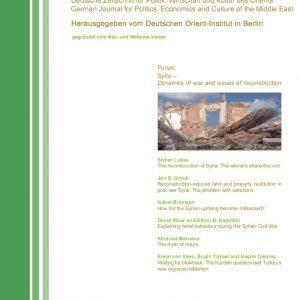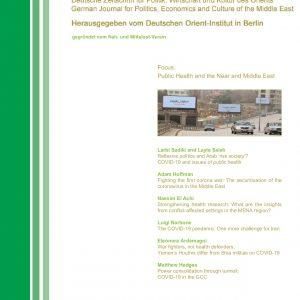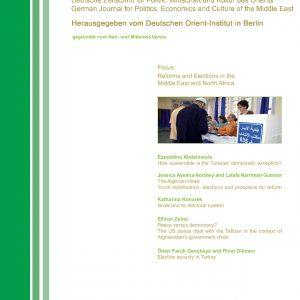Shop
Showing 129–144 of 263 results
-

Reconstruction-induced land and property restitution in post-war Syria: The problem with sanctions
7,90 €incl. VAT
Add to basket -

Waiting for blowback: The Kurdish question and Turkey’s new regional militarism
7,90 €incl. VAT
Add to basket -

The myth of return
7,90 €incl. VAT
Add to basket -

Orient IV 2020
26,00 €incl. VAT
plus Shipping Costs
Select options This product has multiple variants. The options may be chosen on the product page -

Power consolidation through turmoil: COVID-19 in the GCC
7,90 €incl. VAT
Add to basket -

The COVID-19 pandemic: One more challenge for Iran
7,90 €incl. VAT
Add to basket -

Strengthening health research: What are the insights from conflict-affected settings in the MENA region?
7,90 €incl. VAT
Add to basket -

War fighters, not health defenders: Yemen’s Houthis differ from Shia militias on COVID-19
7,90 €incl. VAT
Add to basket -

Fighting the first corona war: The securitisation of the coronavirus in the Middle East
7,90 €incl. VAT
Add to basket -

Reflexive politics and Arab ‘risk society’? COVID-19 and issues of public health
7,90 €incl. VAT
Add to basket -

Orient III 2020
26,00 €incl. VAT
plus Shipping Costs
Select options This product has multiple variants. The options may be chosen on the product page -

Peace versus democracy? The US peace deal with the Taliban in the context of Afghanistan’s government crisis
7,90 €incl. VAT
Add to basket -

Election security in Turkey
7,90 €incl. VAT
Add to basket -

Israel and its electoral system
7,90 €incl. VAT
Add to basket -

The Algerian Hirak: youth mobilisation, elections and prospects for reform
7,90 €incl. VAT
Add to basket -

Orient II 2020
26,00 €incl. VAT
plus Shipping Costs
Select options This product has multiple variants. The options may be chosen on the product page




